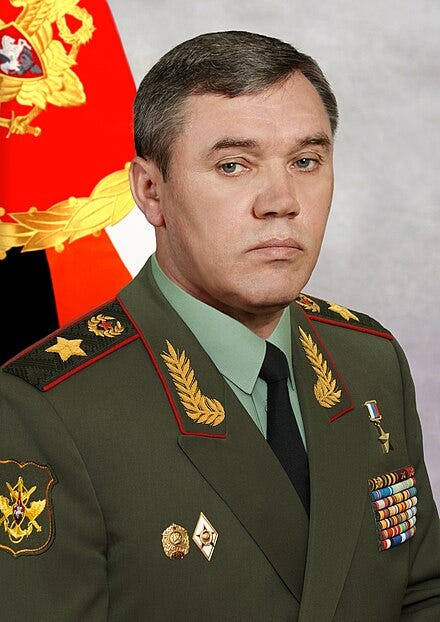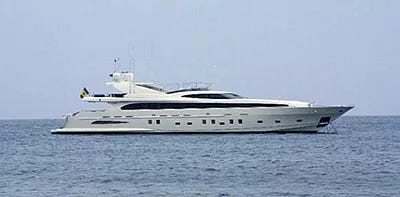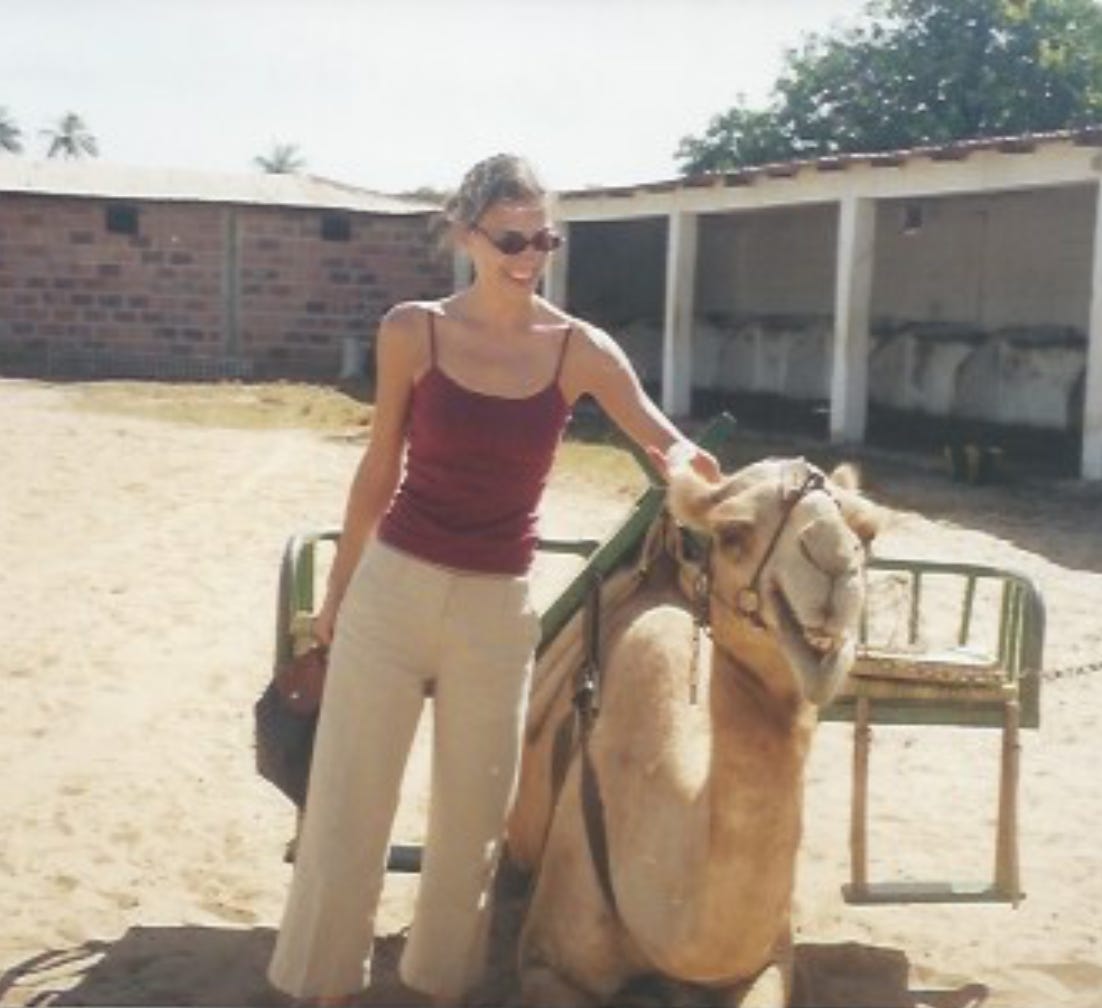From Crudité to Coup d'État
Putin's caterer launched a half-baked mutiny. Will Yevgeny Prigozhin be served his just desserts?
A friendly reminder that Rant! is a reader-supported publication. Please sign up and share! You get a weekly newsletter and paid subscribers get access to my Foreign Influence Operations course and other additional content. I hope you’ll consider subscribing. Class 12 will be posted Monday!
ALEX’S WEEKLY RANT
Last week, Yevgeny Prigozhin, the caterer turned warlord who heads the Russian paramilitary Wagner group, turned his men on Moscow. After taking control of the Russian town of Rostov, Wagner forces began charging north, arriving within 150 miles of the capital, where they abruptly stopped. What happened? And what do these events portend for the future?
What did Prigozhin want?
Increasingly, it looks like Prigozhin wasn’t aiming for regime change. Rather, his ire was aimed at two generals: Sergei Shoigu, the minister of defense, and Valery Gerasimov, head of all Russian forces in Ukraine. For months now, Prigozhin has been calling these two out publicly, blaming them for Russia’s poor performance in Ukraine and highlighting their corruption (which has contributed to Russia’s poor performance in Ukraine).
Prigozhin painted much of this as a populist struggle, accusing Shoigu and Gerasimov of being pampered elites, openly calling them “swine” and criticizing them for “sitting on their big asses smeared with expensive creams.” He also sneered at them for owning yachts, sending their children to the West to be educated, and possessing extravagant villas.
Wagner forces and the Russian military had been having it out on the battlefield, as well. The two groups, despite nominally being on the same side, have shot at each other and blown up each other’s bases. Wagner forces have even kidnapped and tortured Russian soldiers.
Prigozhin’s Concord company (a group of restaurants and catering services) had also started losing lucrative contracts to supply Russian military bases. Putin announced plans to begin placing Wagner forces officially under the control of the Ministry of Defense, as well. Prigozhin risked losing status and money.
What this amounts to is two mafia tribes—Prigozhin and his Wagner forces, and a small group of Russian military leadership—duking it out to establish domination. It’s just that these mafias are armed to the teeth, and one has nuclear weapons.
Also, Prigozhin isn’t actually a populist
The Wagner leader is as corrupt as everyone else in Russia’s elite circles. He owns a yacht and several private jets. And his daughter owns a very expensive showjumping horse in Spain.
Did Prigozhin have (or believe he had) allies in Moscow?
In a country where you can be tossed in prison for holding up a sign that says “Peace,” it’s a pretty risky endeavor to attempt an armed mutiny, unless you have allies in high places.
There have been reports that Prigozhin had discussed his plans with some high-level generals, including Sergei Surovikin. The two had worked together in Syria and are believed to be chummy. Surovikin is also generally perceived as being a more competent military leader than either Shoigu or Gerasimov. Despite that, Putin had replaced him with Gerasimov to run the war in Ukraine.
Surovikin is now reportedly in prison in Moscow, his fate unknown. It puts Putin in a precarious position, having to punish a competent and respected general in the middle of a war Russia is losing. It is sure to increase the paranoia that must be spreading through elite circles these days.
Response of Russia’s civil services and regular military
Prigozhin made it far, fast, with very little resistance from local police, the national guard, or local governments. Nor did the Russian military get in his way. The foot soldiers seemed ready to hedge their bets. They’d let the big dogs fight it out, and wait to see how things developed.
Nor did mid-level civil servants or local governors show any support one way or the other. Rather, there was mostly a response of apathy.
The overall picture this painted was that Moscow was vulnerable, both physically as a city, and politically as the center of power.
Response of Russian citizens
Hot Russian women used to write songs about wanting a man like Putin. But as Moscow went into fortress mode, no one could be bothered to step out on the street to sing Putin’s praises. Instead, many citizens in Rostov—the first town Prigozhin took over—greeted Wagner like rockstars, seemingly enjoying the circus and snapping selfies with Wagner tanks and soldiers.
Not that these folks seemed overly enthusiastic to have Prigozhin in charge, either. His forces are indiscriminate murderers and Prigozhin is famous for killing a deserter with a sledgehammer. Rather, it all seemed more about amusement. Something interesting was happening on the streets, and the generally apathetic public found it entertaining for a bit.
Putin can’t be outdone, however. The man who has been living in nearly total isolation since the pandemic hit, who is reportedly hyper paranoid about his own security, who greets even his closest allies from the far end of a mile-long table, apparently made an appearance in Dagestan shortly after the mutiny to greet his own adoring (and certainly not forced to be there) crowd. (Given Putin’s preference for distance, we must wonder if this was actually one of his lookalikes.)
On the subject of apathy
Putin has spent years cultivating political apathy in Russia. In destroying all sense of truth and flooding the zone with disinformation and propaganda, he has been conditioning his citizens to withdraw from political activity, to believe there is nothing they can do to change any political situation. The idea is to keep citizens focused elsewhere, so Putin and his cronies can use the system for their own benefit.
But the flip side of that coin is: your subjects are just as apathetic to your removal from power. [insert sad trombone gif]
What deal was struck and why did the parties accept it?
As Wagner forces were speeding toward Moscow, Belarus’s Alexander Lukashenko stepped in to broker a deal. Lukashenko’s fate has been tied to Putin’s, so it is understandable he wants Putin to remain in power.
We don’t know much about what deal they struck. Wagner’s forces will be brought under the Russian Ministry of Defense and no one will be charged (in an address after the events, Putin characterized Wagner’s forces as being duped into their actions, suggesting only Prigozhin was to blame). Prigozhin has agreed to go to Belarus, where he reportedly arrived earlier this week.
At least, that’s what we are all being told. However, as of the time I am writing this, Prigozhin has not appeared publicly (in Belarus or anywhere else). Furthermore, a Wagner recruiter doesn’t seem convinced the group is going anywhere, telling this journalist posing as someone who wants to sign up that all is good and Wagner remains based in Russia.
In any case, it still seems odd Prigozhin, who wasn’t facing any real resistance during his mutiny, just stopped suddenly and agreed to go into exile.
Plus, Prigozhin and his forces shot down six Russian helicopters and one transport plane. Putin has killed people for way less than this.
On the other hand, Putin needs the manpower of Prigozhin’s troops, who have given Russia more victory on the Ukrainian battlefield than Russia’s regular army has and many of whom are loyal to Prigozhin.
Putin looks weak
First, no one came out to support Putin. Then, there were reports he had fled Moscow. His oligarchs and other political allies were withdrawing cash and booking flights to Turkey and the United Arab Emirates. Then, after accusing Prigozhin of treason, he decided to let him go in a deal he didn’t even broker himself, but rather was put together by his minion next door.
The emperor looks isolated and weak, and all those around him vying for power likely smell blood.
Remember: the CIA and FBI recently stepped up efforts to recruit Russians
If you’re a midlevel civil servant watching everyone above you duke it out for power and you know you might get caught in the crosshairs, or perhaps an oligarch living in fear of losing your assets and stature as the Russian house of cards begins to fall, you might start looking for an out. A one-way ticket to the US in exchange for some information starts to look like a good option compared to a knife in the back.
A quick note to anyone considering this: It’s best to be one of the earlier volunteers. The longer you wait, the more chance someone else has already given what you have to offer.
The rule of law
Putin’s about face on treason charges for Prigozhin is an example of how arbitrary the law is in Russia. In fact, Russia had recently passed a law saying it was illegal to criticize the Wagner group, and then there was Putin, doing just that.
The FSB, Russia’s internal security service, said it had dropped charges against Prigozhin and his Wagner group because “its participants ceased the activities directly aimed at committing the crime.” So, if you start committing murder but then stop midway, everything’s cool?
Of course, dictators aren’t known for keeping promises. Which is why any current promise not to extract a pound or two of flesh from Prigozhin and his allies should be taken with a giant chunk of salt.
The new power struggle in Moscow
People stay loyal because they are getting something out of the system. The more destabilized that system becomes, the more they question if that loyalty is really worth it. No one wants to lose their position just because a new leader takes over. Therefore, the elites in Moscow are probably scheming to save themselves. Some might even be considering ways to oust the czar.
This is good news for the West and for Ukraine. The more paranoia there is in the upper echelons of Moscow’s power structure, the better. Power vacuums and political scheming create opportunities for anyone looking to crack those fissures open wide.
The power struggle in the military
Will Putin replace Shoigu and Gerasimov? With Surovikin in prison, it seems unlikely. If he does, he risks looking like he gave in to Prigozhin. Perhaps Shoigu and Gerasimov outmaneuvered Prigozhin?
On the other hand, Putin is stuck with two generals that have had a lackluster performance on the battlefield.
Russian military morale
This was already bad, and is now probably worse. Russians being sent to the front (often without proper equipment and weapons due to the corruption of the same military leadership now fighting each other for power) have got to be asking themselves what the hell they are fighting for.
Does Putin have any friends other than Lukashenko?
As Prigozhin was blazing toward Moscow with tanks and Putin prepared to flee, the Russian president called his friends to gauge their willingness to help. Turkey, China, and a number of Central Asian governments responded that this was an “internal matter,” signaling their intention not to get involved.
It was yet another sign that Putin is on his last legs. No one is ready to put themselves on the line to help him.
What does this mean for Ukraine?
As the Ukrainians churned out memes of their fighters sitting back and eating popcorn while watching Russians fight amongst themselves, they certainly understood: internal fighting in Russia is good for Ukraine. They probably wanted it to go on longer. The more Russians are fighting each other, the less they are fighting Ukrainians.
The episode has likely increased Ukrainian morale. An adversary in chaos is good news.
Furthermore, the events of the last few days should put to rest any more notions that we shouldn’t give Ukraine more weapons for fear of upsetting Putin. The dictator caved! He proved himself a coward! Give Ukraine everything it needs to win this fight for democracy and watch Putin crumble.
Putin admits the government has been funding Wagner
Anyone who follows the Wagner group already knew it was not really a private military, but more of an autonomous extension of the state, run by an oligarch who carries out strategic spending on behalf of the Kremlin in return for power and fortune. Furthermore, the Wagner group isn’t really a group, it’s a network of businesses and military groups deployed as needed to push Kremlin interests and fund operations.
The United States has designated Wagner a transnational criminal organization. Now, Putin has admitted to funding it, which means Russia is a transnational criminal organization, which sounds about right. As I discuss in my foreign influence operations course, Russia is a mafia state, just one big criminal organization that happens to control nuclear weapons.
So, about that Russian interference in US elections…
Prigozhin is also the oligarch behind the Internet Research Agency (IRA), which played a big role in influencing US elections. What will become of those efforts and others run through Prigozhin’s Concord company?
Also, now that Putin has admitted to funding Prigozhin, will people finally understand that the IRA’s election interference was actually funded by the Russian government?
Wagner in Africa
How will this affect Wagner’s operations in Africa? Wagner has been a major tool employed by the Kremlin to co-opt African governments, influence populations, and gain control of lucrative mining concessions. Will these events lead some of Wagner’s African partners to question if they’ve hitched themselves to the right horse?
And what does that mean in turn for the Kremlin? Will Russia’s influence in the region begin to wane? And what of the lucrative concessions, which help fund fighters and weapons in Ukraine?
We’ve got more questions than answers. But the bottom line is: the launch of the full-scale invasion of Ukraine will prove Putin’s undoing. As a top Ukrainian national security advisor said, “As the war began, so it will end—inside Russia.”
THE WEEK’S LINKS
A roundup of stories you should be reading
RUSSIA
After Wagner mutiny, Navalny asks why he, not Prigozhin, is jailed (The Washington Post)
UNITED STATES
Why Donald Trump Was So Mad at Mark Milley That He Confessed to a Crime (The New Yorker)
DEMOCRACY
How to Fight the Global Far-Right Alliance Threatening Democracy (Just Security)
Alex Finley is a former officer of the CIA’s Directorate of Operations, where she served in West Africa and Europe. She writes and teaches about terrorism, disinformation / covert influence, and oligarch yachts. Her writing has appeared in Slate, Reductress, Funny or Die, POLITICO, The Center for Public Integrity, and other publications. She has spoken to the BBC, MSNBC, CNN, C-SPAN’s Washington Journal, France24, and numerous other media outlets. She was also invited once to speak at Harvard, which she now tells everyone within the first ten seconds of meeting them. She is the author of the Victor Caro series, satirical novels about the CIA. Before joining the CIA, Alex was a journalist, covering Capitol Hill, the Pentagon, and the Department of Energy. She reported on issues related to national security, intelligence, and homeland security. Did she mention she was invited to speak at Harvard?







